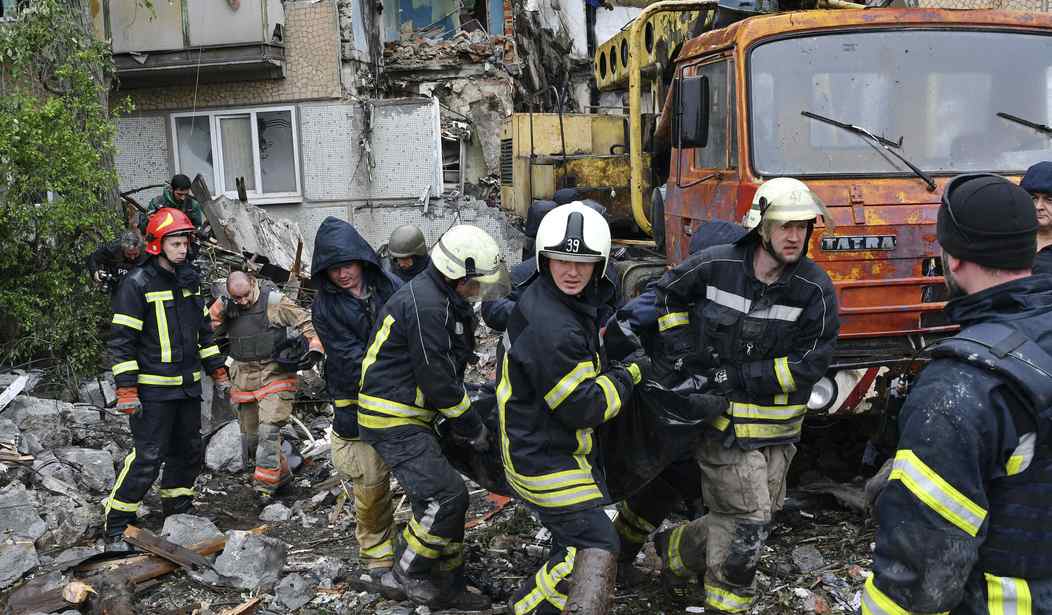When Russia attacked Ukraine, "experts" said the country would fall within days.
It hasn't.
One reason is that the Russian military wasn't as effective as people thought.
Another is that Ukrainians surprised the world by courageously defending their country.
A third reason is that volunteers from everywhere stepped in to help.
People with combat experience joined Ukraine's Foreign Legion. Doctors, nurses and others with medical experience are keeping the country's health care system going. Several thousand others do humanitarian work, like distributing food and medicine.
For my video this week, Stossel TV executive producer Maxim Lott went to Ukraine to record them at work.
He rode along with ambulance driver Didrik Gunnestad, a 27-year-old volunteer from Norway. Gunnestad delivered supplies, and then he drove sick people out of dangerous areas.
"It was learning by doing," he says. Ambulances were desperately needed. "Most things that happen here are done by volunteers, not government officials."
Tom Palmer, an American with the Atlas Network think tank, raised more than $1 million in aid for Ukraine. He flew it to Poland and then drove some of it into Ukraine himself. He worked with Ukrainian volunteers to find out where aid was most needed.
"It was just astonishing to see this network emerge," says Palmer. "It wasn't centrally directed ... (Volunteers) solved a lot of micro problems that big hierarchies can't see."
The volunteers also reduce waste.
Recommended
"There is a lot of loss (in big charities like the Red Cross)," says Gunnestad. "Not that someone is skimming off the top; it's just the cost of being a big organization."
Governments are even more bureaucratic.
Poland's government does want to help Ukraine, but its bureaucracy often makes it hard. When Gunnestad and Lott went to a depot where Gunnestad had previously picked up donated goods, they found that the bureaucracy had changed the rules. Now Gunnestad was supposed to write a letter to the Polish government to get supplies. Since they didn't have time to wait, they left empty-handed.
Even the Ukrainian government makes it needlessly hard for volunteers to deliver goods. They force most everyone to wait in long lines at the borders. When Lott and Gunnestad crossed this summer, there were still mile-long lines.
Ambulances, at least, are generally allowed to skip the line.
"But sometimes there's a guard who doesn't like it," says Gunnestad. "We have had patients almost dying because of guards like that."
As he drove past the long line of trucks, he sighed and said, "I feel so sorry for the drivers of the trucks. Some could be in line for days, or even a week!"
Many of those truckers are trying to bring in needed supplies, but "they were only allowing 400 Ukrainian trucks per day," says Palmer. "That's just nothing. Why couldn't they bring in more? If you need to inspect them, get more inspectors!"
The bureaucracy didn't.
"You have maybe seven checkpoints, but only two are open," complains Gunnestad. "They could at least open all seven."
Lott notes, "Volunteers can't do everything. They don't supply the military or provide fuel. But they are saving lives."
For example, Gunnestad's team picks up patients at overburdened hospitals and takes them to less busy facilities.
They also deliver supplies to neglected Ukrainian hospitals. Gunnestad says small hospitals often get nothing from the government or the Red Cross. "We have a chance to help places that's forgotten," he says.
You can help Gunnestad do this work by donating to his GoFundMe page. It's a way to help Ukrainians without taking the risks that Gunnestad does.
His ambulance has been hit with bullets. Fortunately, no volunteer has been hit.
"I always have been the person who runs into dangerous situations," he says. "I think this work is so meaningful that I'm willing to die for it."
























Join the conversation as a VIP Member